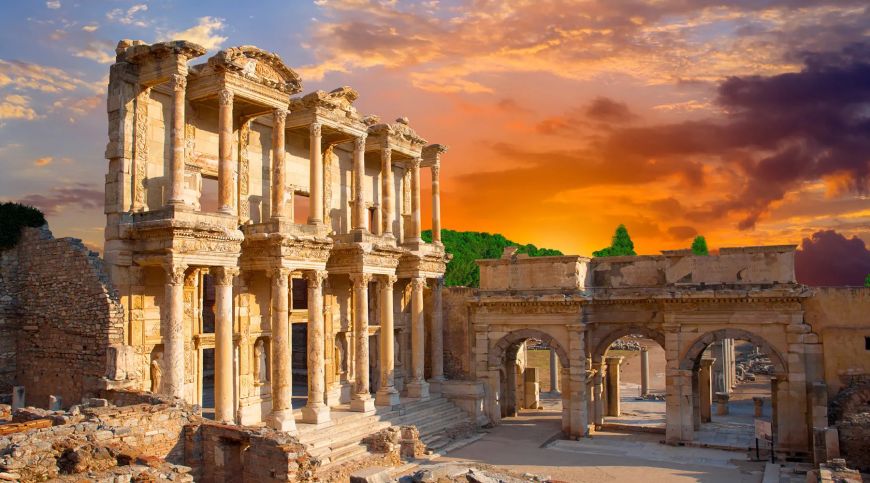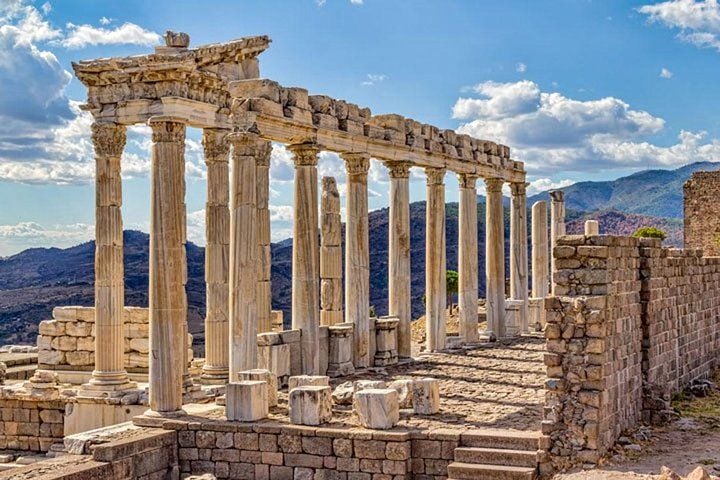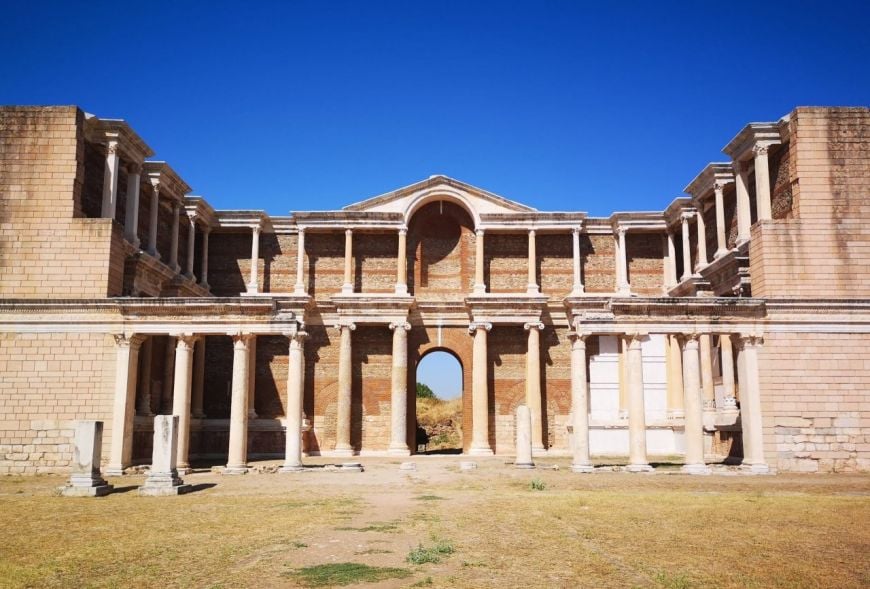The 7 churches of Revelation are a series of early Christian communities mentioned in the New Testament's Book of Revelation, chapters 2 and 3. These churches are all located in Asia Minor, which is modern-day Turkey. The letters to these churches, delivered through the apostle John, serve as spiritual messages from Jesus Christ, addressing both their strengths and weaknesses. Understanding the significance of the 7 churches of Revelation in Turkey helps to uncover the spiritual lessons for believers throughout history.

These ancient churches represent various states of faith and morality, making them timeless symbols for Christian communities around the world. Each church's message reflects the struggles, growth, and challenges of maintaining Christian values in a non-Christian world.
Historical Context of the 7 Churches of Revelation
The 7 churches of Revelation were all situated in the Roman province of Asia Minor during the first century AD. This area was an important hub for trade, culture, and religion in the ancient world. Christianity spread quickly throughout these cities, but the communities faced opposition from both Roman authorities and pagan worshippers. The messages directed to these churches address issues such as persecution, false teachings, complacency, and spiritual vitality.
The seven churches are:
- Ephesus
- Smyrna
- Pergamum
- Thyatira
- Sardis
- Philadelphia
- Laodicea
Ephesus: The Loveless Church
Ephesus was one of the most prominent cities in Asia Minor, known for its wealth, culture, and famous Temple of Artemis, one of the Seven Wonders of the Ancient World. The Christian church in Ephesus was well-established, having been founded by Paul, and later, John the Apostle is believed to have resided here.
In Revelation, Jesus praises the Ephesian church for their perseverance, hard work, and refusal to tolerate false apostles. However, He criticizes them for abandoning their "first love." This suggests that while they remained doctrinally sound, they had lost the passion and love they once had for God and each other.
What Does Ephesus Represent?
Ephesus represents the church that maintains outward faithfulness but has lost its spiritual fervor. The message is a call to return to the love and devotion they had at the beginning of their journey.
Smyrna: The Persecuted Church
Smyrna, now modern-day Izmir, was a thriving port city known for its loyalty to Rome. The Christian community in Smyrna faced intense persecution, especially from Jewish and Roman authorities. Many Christians in Smyrna were martyred for their faith.
Unlike some of the other 7 churches of Revelation, Smyrna receives no criticism from Christ. Instead, He acknowledges their suffering and encourages them to remain faithful even in the face of death. Jesus promises that their perseverance will be rewarded with the "crown of life."
What Does Smyrna Represent?
Smyrna represents the persecuted church, symbolizing steadfast faith in the face of trials. The message is one of encouragement, reminding believers that endurance in suffering leads to eternal reward.
Pergamum: The Compromising Church
Pergamum was a major political and religious center in Asia Minor, known for its temples dedicated to Roman emperors and Greek gods. The Christian community in Pergamum faced pressure to conform to the pagan practices that were widespread in the city.

Jesus commends the Christians in Pergamum for remaining loyal to Him, even in the midst of a city described as the place "where Satan’s throne is." However, He also warns them about the dangers of allowing false teachings to infiltrate their community. Some Christians in Pergamum had begun to compromise their beliefs by participating in pagan rituals.
What Does Pergamum Represent?
Pergamum represents the church that compromises its values in order to fit in with the surrounding culture. The message is a warning to resist the temptation to blend Christianity with pagan practices and to stand firm in the truth.
Thyatira: The Corrupt Church
Thyatira was a smaller city known for its trade guilds, particularly in textiles and dye production. The Christian community here faced a different challenge: internal corruption. Many of the guilds in Thyatira required participation in pagan rituals, and some members of the church began to tolerate false teachings.
Jesus praises the church in Thyatira for their deeds, love, and faith, but He severely criticizes them for tolerating a false prophetess referred to as "Jezebel." This figure had led some believers astray by encouraging immoral practices and idolatry.
What Does Thyatira Represent?
Thyatira represents the church that tolerates sin and false teachings within its own community. The message is a call for purification, warning against the dangers of compromising on moral and spiritual integrity.
Sardis: The Dead Church
Sardis was once a wealthy and influential city, but by the time the Book of Revelation was written, it had fallen into decline. The Christian community in Sardis had a reputation for being spiritually alive, but in reality, they were described as spiritually dead.
Jesus rebukes the church in Sardis for being complacent and spiritually lifeless. He urges them to "wake up" and strengthen what little remains of their faith before it completely dies.
What Does Sardis Represent?
Sardis represents the complacent church that is content with its past successes and no longer strives for spiritual growth. The message is a call to awaken from spiritual slumber and revive one's commitment to faith.
Philadelphia: The Faithful Church
Philadelphia was a smaller and less prominent city compared to others on the list, but the Christian community here remained strong and faithful. The city was known for its frequent earthquakes, yet the church remained steadfast in its faith.

Jesus praises the Christians in Philadelphia for their perseverance and faithfulness. Despite their small numbers and hardships, they have kept Christ’s word and not denied His name. He promises them protection and reward for their loyalty.
What Does Philadelphia Represent?
Philadelphia represents the faithful and obedient church, symbolizing perseverance and trust in God. The message encourages believers to hold on to their faith, even in difficult times.
Laodicea: The Lukewarm Church
Laodicea was one of the wealthiest cities in the Roman Empire, known for its banking, textiles, and medical industries. However, the church in Laodicea had grown spiritually indifferent and self-sufficient, relying on their material wealth rather than God.
Jesus rebukes the Laodicean church for being "lukewarm"—neither hot nor cold. Their spiritual indifference makes them distasteful to Christ. He urges them to recognize their spiritual poverty and to seek true riches from Him.
What Does Laodicea Represent?
Laodicea represents the self-sufficient and indifferent church that has become complacent and lukewarm in its faith. The message is a call for repentance and renewed spiritual fervor.
What Do the 7 Churches in Revelation Represent?
The seven churches of Revelation represent different types of Christian communities, each facing unique spiritual challenges. From the faithful perseverance of Smyrna to the lukewarm complacency of Laodicea, these churches serve as timeless symbols for the diverse spiritual conditions found within Christianity today. Each message provides lessons on how to maintain a strong, vibrant faith in the face of trials, temptations, and complacency.
The 7 churches reflect the ongoing struggles that believers face in their spiritual journeys, offering guidance on how to stay true to the core values of Christianity.
Visiting the 7 Churches of Revelation in Turkey
For those interested in biblical history, visiting the 7 churches of Revelation in Turkey offers a unique opportunity to explore early Christianity’s roots. The ruins of these ancient cities provide not only a glimpse into the past but also a spiritual reflection on the messages given to these churches.
Today, sites like Ephesus and Pergamum are well-preserved archaeological areas, attracting visitors from around the world. Laodicea and Sardis, though less well-known, also offer meaningful experiences for those seeking to connect with biblical history.
Conclusion
The 7 churches of Revelation in Turkey offer valuable lessons for Christian communities throughout history. Whether it’s the perseverance of Smyrna or the spiritual complacency of Laodicea, the messages to these churches are timeless and relevant for today’s believers. They serve as a reminder to remain faithful, resist compromise, and renew spiritual devotion when needed.
By understanding what the 7 churches in Revelation represent, modern believers can reflect on their own spiritual state and take lessons from the strengths and weaknesses of these early Christian communities.
We are always ready to answer all your questions, please reach out via Whatsapp +90 (532) 158 42 44
If you want to emigrate or buy an apartment in Turkey or own a property in turkey and enjoy life by the sea, message our specialists who will find the best options for your budget.
Also, subscribe to our YouTube channel and Instagram page to receive information from the professionals!
An additional channel to connect with us: Telegram
Team Tolerance | 20 years alongside you
